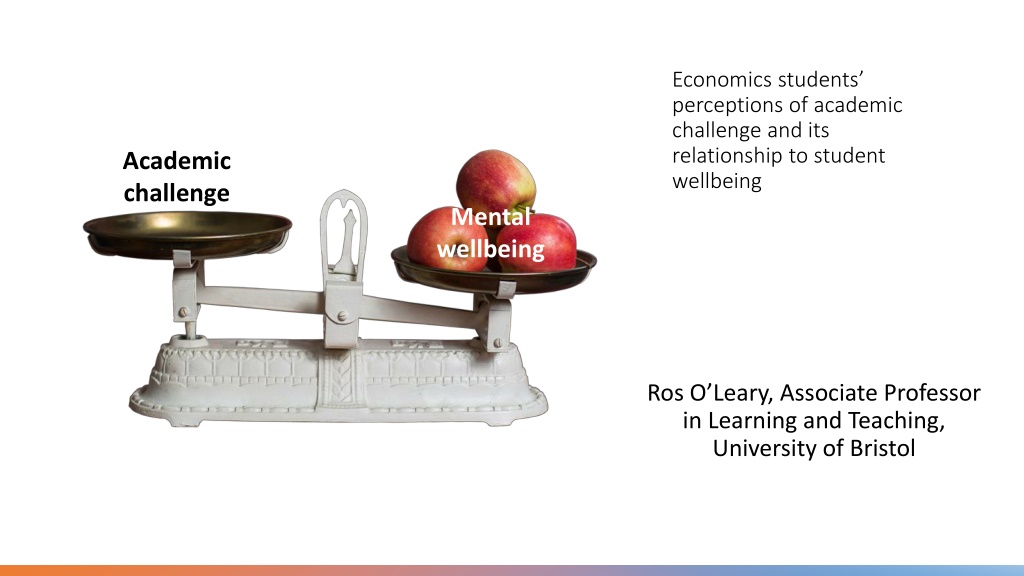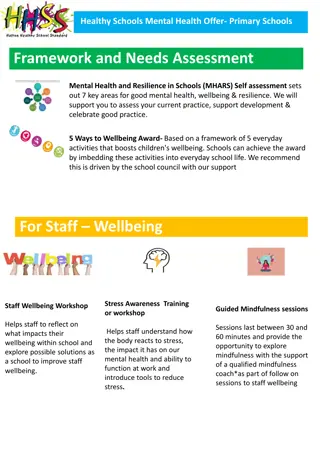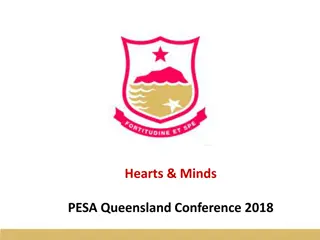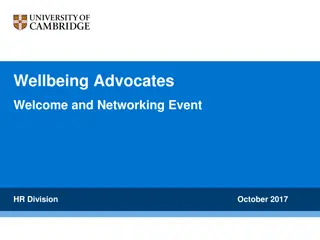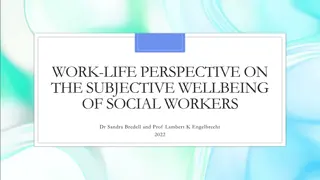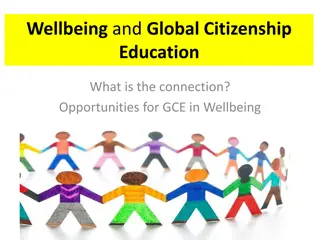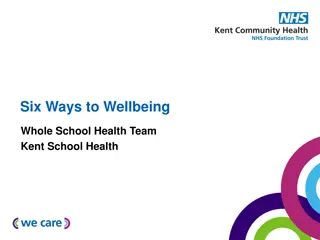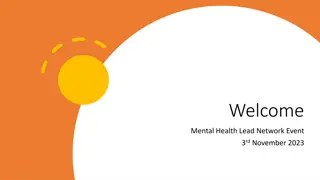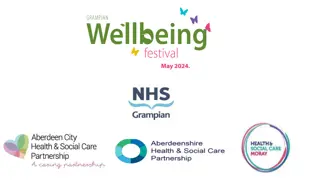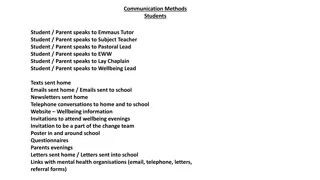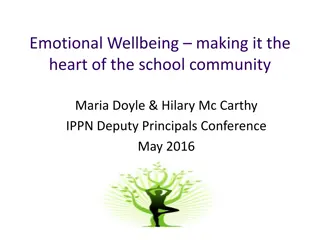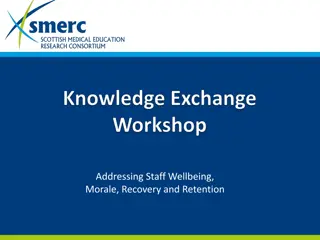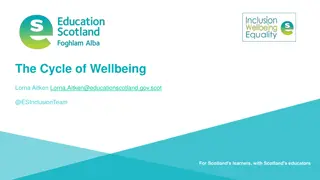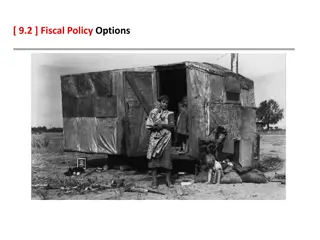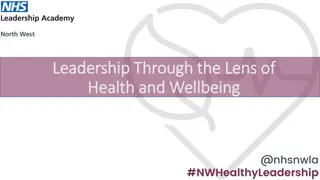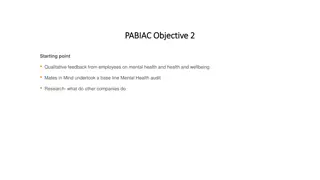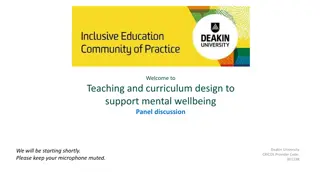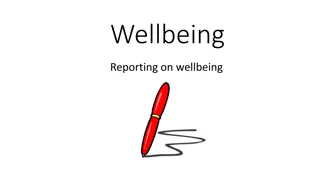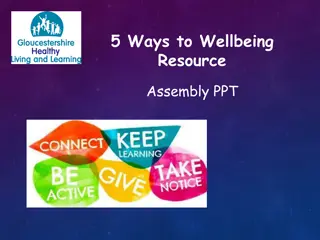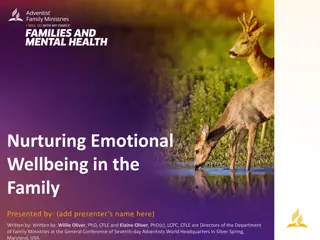Exploring Economics Students' Perceptions of Academic Challenge and Its Impact on Mental Wellbeing
This research investigates the relationship between academic challenge and student mental wellbeing among economics students. Highlighting the importance of addressing student anxiety in higher education, the study aims to understand how academic challenge influences student performance and overall wellbeing. By delving into students' experiences and perceptions, the research seeks to provide valuable insights for enhancing curriculum design and student support strategies.
Download Presentation

Please find below an Image/Link to download the presentation.
The content on the website is provided AS IS for your information and personal use only. It may not be sold, licensed, or shared on other websites without obtaining consent from the author. Download presentation by click this link. If you encounter any issues during the download, it is possible that the publisher has removed the file from their server.
E N D
Presentation Transcript
Economics students perceptions of academic challenge and its relationship to student wellbeing Academic challenge Mental wellbeing Ros O Leary, Associate Professor in Learning and Teaching, University of Bristol
The context and why it is important The student is perforce required to venture into new places, strange places, anxiety-provoking places. This is part of the point of higher education. If there was no anxiety, it is difficult to believe that we could be in the presence of a higher education. (Barnett, 2007, p. 247) HE student mental wellbeing relatively low compared to general population; significant fall in 2021; slight recovery in 2022 (Neves and Brown 2022) Students perform less well when anxious (Barnett, 2007) The only guaranteed points of contact between a student and their university are their academic staff and the curriculum (Hughes et al, 2019)
Why this research? Increasing body of research exploring connections between curriculum and mental wellbeing (Marks and Steuer, 2008; Slavin, Schindler and Chibnall, 2014; Houghton and Anderson, 2017), Little about explicit connection between academic challenge and student mental wellbeing Students experts in their own experience so their perceptions important (Douwes et al, 2023) Qualitative/interpretative research to best fit the types of questions I am asking (Menter, 2017). Not generalising but exploring in depth particular cases enhance understanding of context, communities and individuals (Hamilton and Corbett-Whittier, 2013)
What is mental wellbeing? The WHO defines mental health as a state of wellbeing which the individual realises his or her own abilities, can cope with the normal stressors of life, can work productively and fruitfully and is able to make a contribution to his or her community (WHO, 2014, p. 10) ONS - how are you doing? (life satisfaction, how worthwhile your life is, and how happy and anxious you are (2020) More than mental health (Houghton and Anderson, 2017; Hughes and Spanner, 2019) Connected to community and society
What is academically challenging? What is hard and why is it hard? Is it academically stretching or is it hard for other reasons (unclear, students are unprepared, lack the skills or resources?) National Student Survey of Engagement academic challenge (Indiana University, 2022) Higher-Order Learning: challenging intellectual and creative work Reflective & Integrative Learning: make connections between learning and the world, re-examine their own beliefs and considering issues and ideas from others' perspectives
The research 1 research-led University; 1 teaching-intensive: 2nd year undergraduates 2021 3 courses (History/Economics/Biochemistry or Biomedical Sciences) Survey friendship conversations (Parkin and Heron, 2019) round table analysis sessions (ibid, 2019)
The economics courses University 1 Research-led BSc Economics 20/21 ; 375 students High tariff including A level maths More maths intensive Mostly assessed through exams University 2 Teaching-intensive BA Economics 20/21; 100 students Lower tariff, any subject More history, context focused 40% coursework
Nature of challenge in economics Economics is both maths based and analytical/essay based - so being able to do well at both the numerical side of things and analytical side of things has been challenging. (Uni 2 survey respondent) Last year in my pure economics lectures I would often find the content quite challenging and have to go over it numerous times in the textbook until I fully understood it. (Uni 1 survey respondent) Yes, for instance, last year when doing the course Maths for Economics it was really hard to grasp some of the concepts and there was a lot of content to get through as well. (Uni 1 survey respondent)
Anxiety (and judgement) Student A Uni 1: Like you don't want to ask stupid questions, you don't want them to think you're an idiot, or anything like that. And that also applies to asking other students on the course for help cause sometimes, if I don't understand something, I worry that it's because I didn't pay attention or I misread it, like it's not actually difficult and I'm just being about it. Student B Uni 1: And so I feel nervous about asking other people and asking lecturers and things like that, 'cause I don't want them to judge me or to make me feel like I'm being stupid.
Anxiety (and confidence) Student D Uni 2: I just don't like putting my hand up and I also don't like other people hearing me. I don t know Student C Uni 2: And I don't want to do it when there s strangers about! [laughs] Yeah. And I think it's a shame actually 'cause it would be nicer to just to feel a bit more confident to ask questions, but I know that's never going to happen! [laughs]
Connections (with staff) Student B Uni 1: And even during lectures like that I probably feel the least connected to staff as well, 'cause for me it's just like as if I was watching a video that a lecturer had recorded. You know, very straightforward, where they're just focused on getting through the material and not actually asking any questions or anything. Student A Uni 1: It s similar to be fair in some of the exercise lectures, even though there's only 15 to 20 students in a classroom, because there doesn't seem to be any back and forth. Student D Uni 2: I think with staff, I think when you know, like xxx tries to learn everyone s name, I think that's really nice. I think that makes you feel like more of like an A Level, GCSE type of school relationship where the teachers actually know you and you're not just a face in a hall.
Connections (with peers and learning) Student B Uni 1: Yeah. And also for me personally, I'd say that when there s a two-hour lecture, if it's purely theory and you have to just read through the lecture slides and basically there's no actual interaction between the professor and the student, it usually seems like it goes on even more slowly than it would have been if it was a seminar where you have to participate. Student A Uni 1: I understand university is about, obviously for each person it's about their singular education, how much they can achieve, what they can do with it. But working with other people is also really important and having that chance to do it and to learn from other people is really enjoyable.
Connections (with peers and learning) Student D Uni 2: I've been really stressed recently [laughs] with deadlines approaching and the econometrics things, and I really like that I can talk to you, I can talk to xxx, you know, I can talk to you guys about the assignment and it's not as isolated. Student B Uni 1: And similarly, the time I felt most connected to other students was actually during group projects . Student A Uni 1: So I think yeah, the creation of a sort of safe and non-judgmental space like a small study group would be a good opportunity to help out other people and to get help yourself.
Connections (with peers and learning) Student A Uni 1: And also, it gives you access to a whole lot of people from a whole lot of different places, backgrounds, who were raised differently, and it's good to be able to talk about issues and to get a variety of views. And I think that can help you make a difference in society, by both giving you the ability to analyse situations and act appropriately, and also giving you a far more rounded view of the world. 'Cause if you grow up in one area and you interacted with people who were very similar to you, you're going to have a certain view of the world. And also you might not know much about the wider world because you've never met someone who's from another part of it.
Connection to the subject and the world Student A Uni 1: Although we can understand the theory and this leads to this which causes this and so on and so on, it d be nice to look at a real example and go so this is what happened, and this proves the model or shows the theory we're looking at in the real world. Student C Uni 2: Yeah, and I think in economics we re quite lucky 'cause it s very relevant every day, like something s happening around the world which will have an impact on a market or something. So it is relevant, yeah, which is lucky. I feel like history would be less relevant or something! [laughs] Student D Uni 2: Yeah! [laughs] And I enjoy as well, like I said before, theory and stuff I really enjoy learning about. I like learning about different viewpoints and different theories and schools of thought and stuff.
Connection to future work Student D Uni 2: I think it's nice to know that some of the skills that you're learning could be helpful. I think it's a bit disheartening if you felt as if you were doing stuff that s pointless, which can be the case with our course I think. I think sometimes it makes you lose motivation if you know that you're never going to use that ever again in a way, it's a bit like, well what is the point if that skill or this information is never going to help me? Student B Uni 1: Yes, yeah. And especially in your jobs, if you do work in a sector related to finance, for example, economics, business, you don't really deal in only the theory, you mainly deal in the practice. Student A Uni 1: - and university s supposed to prepare you for work, and I feel like at the end of these three years, or four if you do a Master s or whatever, when you go into the real world you've got all the theory, and that's great, but you need to be able to apply that to actual situations.
Assessment is stressful Student A Uni 1: With assessments, for me the least enjoyable thing is how much pressure I feel, and I know part of it is obviously they re important, there should be some amount of pressure so that you actually do your best. But it seems like there's so much riding on these assessments and there is. Yes, different format to other exams I had take and I felt we were not given enough practise/mock questions to make me feel confident in answering exam questions. (Uni 1 survey respondent)
Assessment types Student D Uni 2: : I think yeah, I think I prefer coursework definitely. I think course work I find more comfortable, especially if it's open book, because you can, you know, show what you actually understand and not you just what you remember. Student A Uni 1: Yeah. And with MCQs as well it's quite nice because you're given, say four answers that it could be. You can tell if you're way off or if you're in the right sort of area. Whereas with an essay or an exam it's hard to get yourself onto the right track or know if you're on the right track because there's no guidance along with the answers . Student B Uni 1: Yeah. And there's also loads of ways you can write a good essay, like every Single person can write a perfect essay that will be completely different from another person. So it's very individual, whereas in maths you've got one right answer and that's it s, you don't have to do any guessing.
Key themes Importance of connections and relationships (Quinlan, 2016) staff, peers, subject, the world High expectations and perfectionism counter to taking risks and making mistakes (Jones et al, 2021) Normalising nerves when under pressure: wellbeing of self and others (Wilson et al, 2022) Assessment: is it stressful or is it academically challenging? (Jones et al, 2021) Tension between supporting students in their learning and helping them develop themselves
Key takeaways Connections/relationships: Understanding yourself and your own values Connected to the subject and what is happening in the world Connecting with peers (make friends and share problems) Improve relationships with academics Assessment: Focus on challenging assessment (authentic, synthesis) Choice/student agency Support: more opportunities for feedback and reflection; active engagement with a range of examples
Thank you and questions?
References Barnett, R. (2007) A will to learn: being a student in an age of uncertainty. Society for Research into Higher Education & Open University Press. Douwes, R. et al.(2023) Well-being of students in higher education: The importance of a student perspective , Education, psychology and counselling. Cogent, 10(1). Hamilton, L. and Corbett-Whittier, C. (2013) Using Case Study in Education Research , Using Case Study in Education Research. SAGE Publications Ltd.. Houghton, A.-M. and Anderson, J. (2017) Embedding mental wellbeing in the curriculum: maximising success in higher education. Hughes, G. and Spanner, L. (2019) The University Mental Health Charter. Leeds. Available at: https://www.studentminds.org.uk/uploads/3/7/8/4/3784584/191208_umhc_artwork.pdf (Accessed: 7 November 2021). Menter, I. (2017) Reasons for Education Research , in The BERA/SAGE Handbook of Educational Research. SAGE Publications Ltd, pp. 37 52. Neves, J. and Brown, A. (2022) Student Academic Experience Survey 2022. NSSE Indiana University (2022) Engagement Indicators: NSSE. Available at: https://nsse.indiana.edu/nsse/survey-instruments/engagement- indicators.html (Accessed: 9 January 2022). Parkin, H. J. and Heron, E. (2019) Listening matters!: the challenge of genuine listening in a higher education setting for the purpose of change , in Methodological Innovation to Meet 21st Century Societal Challenges. Manchester. Slavin, S. J., Schindler, D. L. and Chibnall, J. T. (2014) Medical Student Mental Health 3.0: Improving Student Wellness Through Curricular Changes , Academic Medicine. Wolters Kluwer Health, 89(4), p. 573. Steuer, N. and Marks, N. (2008) University challenge: Towards a well-being approach to quality in higher education. London.
